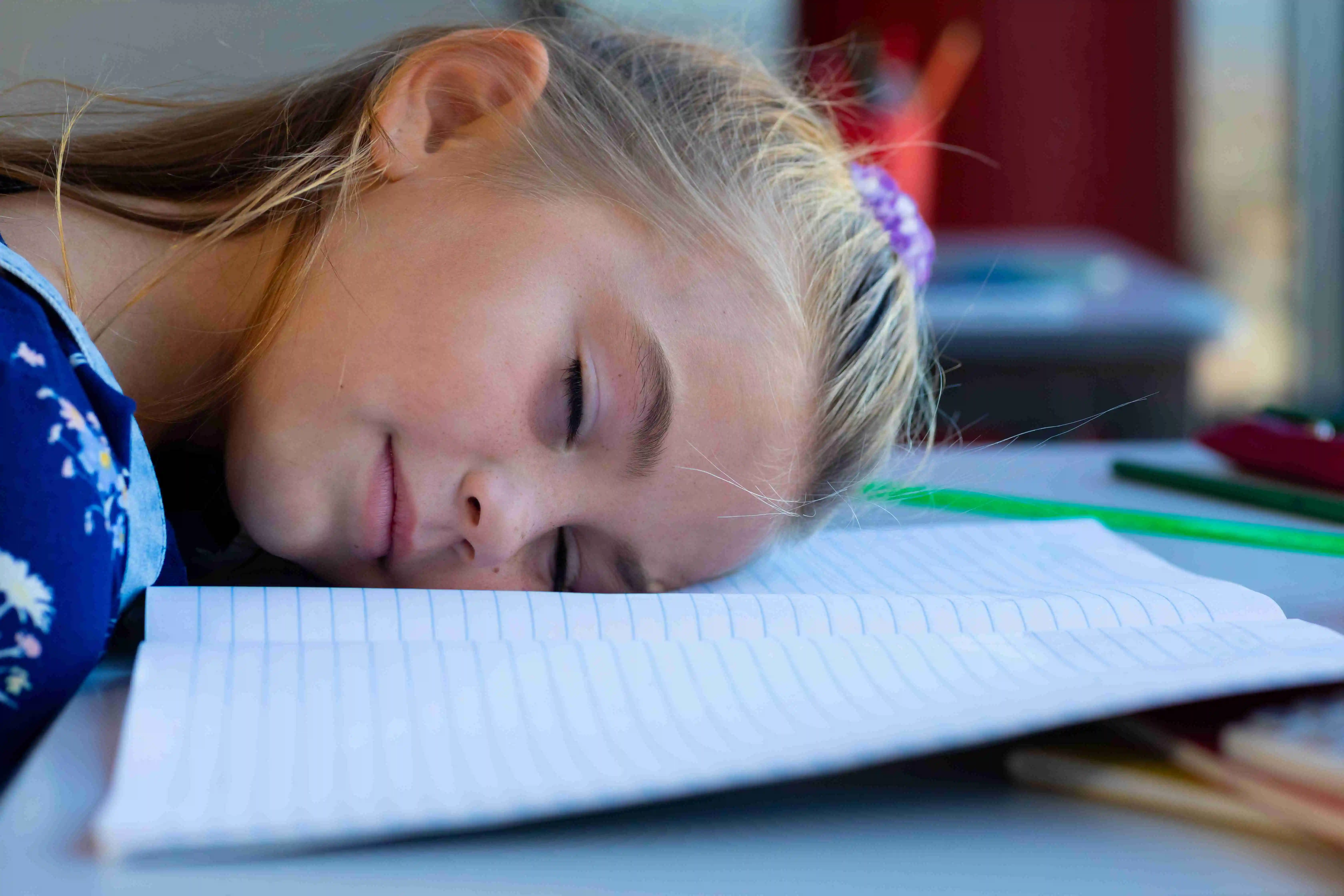
The importance of sleep in child development cannot be understated, as it is during sleep that their bodies and minds get much-needed rest and restoration. Adequate sleep is essential for proper growth, cognitive function, and emotional regulation.
Parents need to prioritize and encourage healthy sleep habits in children to support their physical, mental, and emotional development.
Why Is Sleep Important For Children?
Physical Growth and Development
- Growth Hormone Release: During sleep, the body releases growth hormones that promote the development of muscles, bones, and tissues. This is particularly crucial during early childhood and adolescence when rapid growth occurs.
- Cellular Repair and Regeneration: The body repairs damaged cells and generates new ones during sleep. This process is critical for children's tissue and organ growth and development.
- Immune System Support: The immune system, which is crucial in defending the body against infections and diseases, is closely linked to sleep.
Physical Health and Safety
- Healthy Weight Management: Sufficient sleep helps regulate appetite hormones and reduces the likelihood of overeating, which can contribute to weight gain. Lack of sleep is usually linked to an increased risk of childhood obesity.
- Energy and Vitality: Adequate sleep allows children to recharge and rejuvenate their bodies and minds. It enhances their cognitive functioning, attention span, memory, and learning abilities.
- Safety and Alertness: When children are well-rested, they are more alert and less prone to accidents or injuries. Lack of sleep can lead to impaired judgment, decreased coordination, and slower reaction times, increasing the risk of accidents or mishaps.
Cognitive Development
- Memory Consolidation: When children sleep, their brains consolidate and organize the information they have learned throughout the day.
- Learning and Problem-Solving: Sufficient sleep allows children to better focus and concentrate, leading to improved academic performance. It also enhances memory formation, enabling children to recall and apply what they have learned effectively.
- Attention and Focus: Without adequate sleep, children may struggle with concentration, attention span, and academic performance.
Emotional Well-Being and Behavioral Health
- Mood Regulation: Lack of sleep can lead to increased irritability, mood swings, and difficulty regulating emotions.
- Behavioral Stability: Sleep is essential for children to maintain behavioral stability and emotional balance, and a lack of sleep can contribute to behavioral problems such as hyperactivity and impulsivity.
- Reduced Risk of Mental Health Issues: Lack of sleep can contribute to the development of mental health disorders such as anxiety and depression in children.
The Consequences of Sleep Deprivation in Children

Decrease in Attention
One of the cognitive effects of sleep deprivation is a noticeable decrease in attention. When children do not get enough sleep, they may experience difficulties in paying attention and focusing on tasks. This can harm their academic performance and their ability to learn and retain information.
Impaired Memory and Learning
There’s a strong connection between sleep and learning. Sleep deprivation can impair memory consolidation for children, making it more challenging for them to remember and recall information. so parents must understand how sleep affects learning for children and how to combat its negative effects.
Negative Impact on Development Processes
Lack of sleep can impair attention, memory, and problem-solving skills, making it difficult for children to concentrate and perform well academically.
Poor Immune System
When children are sleep-deprived, their immune systems may not function optimally, making them more susceptible to illnesses and infections. This can lead to frequent illnesses and longer recovery times for children who are not getting enough sleep.
Growth Inhibition
Sleep is essential for proper growth and development in children. Deep sleep stages primarily release growth hormones, and inadequate sleep can disrupt this hormone production.
Hypertension and Cardiovascular Issues
One of the most alarming effects of a lack of sleep is the increased risk of developing hypertension and cardiovascular issues. Lack of sleep can lead to high blood pressure and an increased strain on the heart.
Mood Swings and Irritability
Lack of sleep can make children irritable, moody, and prone to emotional outbursts. They may also experience increased levels of anxiety and stress.
Behavioral Problems
When children do not get enough sleep, they may become irritable, moody, and have difficulty regulating their emotions. This can lead to tantrums, aggression, and poor impulse control.
Reduced Energy and Vitality
When children do not get enough sleep, they often feel tired and sluggish throughout the day. This can impact their ability to concentrate, learn, and perform well in school or other activities.
Increased Risk of Obesity
Lack of sleep disrupts the hormonal balance in the body, leading to increased appetite and cravings for high-calorie foods. Additionally, sleep-deprived children may be less physically active during the day, further contributing to weight gain.
How much sleep do children need?

Toddler (1-3 Years)
Toddlers aged 1-3 years require slightly less sleep, with a recommended range of 12–14 hours per day. At this age, most children have transitioned to one nap during the day, which usually lasts for 1-3 hours.
Preschooler (3-5 Years)
Preschoolers aged 3-5 years generally need around 10–13 hours of sleep per day. As they grow older, they may start to resist napping during the day, so it is important to ensure they are getting enough nighttime sleep to meet their needs, and to pick a mattress for kids that would suit their needs.
School-aged (4–12 Years)
School-aged children between 4 and 12 years old typically need around 9 and 12 hours of sleep per night. However, many children in this age group do not get enough sleep due to various reasons, such as busy schedules, homework, or screen time.
Common Sleep Problems in Children
Insomnia
Insomnia refers to the difficulty of falling or staying asleep. Various factors, including anxiety, a disrupted sleep schedule, or certain medical conditions, can cause insomnia.
Children with insomnia may have trouble falling asleep at bedtime, experience frequent awakenings during the night, or wake up too early in the morning.
For more information about Anxiety and insomnia and their effects on sleep, check the article “Anxiety and Insomnia”.
Snoring and Sleep Apnea
The vibration of the airway tissues during sleep causes snoring, which is noisy breathing. It can disrupt the child's sleep and lead to daytime sleepiness and poor concentration.
On the other hand, sleep apnea is a more serious condition where the child's breathing is repeatedly interrupted during sleep. This can result in significant health issues, including developmental delays, behavioural problems, and poor growth.
Frequent Waking During the Night
Many factors, such as discomfort, hunger, or even nightmares, can cause children to wake up frequently during the night. Parents need to establish a consistent bedtime routine and create a sleep-friendly environment to help their child stay asleep throughout the night.
Additionally, addressing any underlying medical or psychological issues, such as sleep apnea or anxiety, may also be necessary to improve sleep quality.
Nightmares
Nightmares are vivid and disturbing dreams that frequently wake a child up at night. Stress, anxiety, or even certain medications can trigger them. Nightmares can leave children feeling frightened and anxious, making it difficult for them to fall back asleep.
Night Terrors
Unlike nightmares, night terrors occur during deep sleep and are characterized by intense fear and screaming. Children experiencing night terrors may appear inconsolable and confused, and they may not remember the episode the next morning.
Bedwetting (Nocturnal Enuresis)
Bedwetting, also known as nocturnal enuresis, is a common sleep problem in children that involves involuntary urination during sleep. Various factors, including delayed bladder development, genetics, or urinary tract infections, can cause it.
Sleep Talking and Sleepwalking
Sleep talk is a harmless condition in which the child talks or mumbles during sleep. It can range from simple murmurs to full conversations at any stage of sleep.
Sleepwalking is yet another common sleep problem among children. Sleepwalking, also known as somnambulism, is when a child gets out of bed and walks or performs other activities while still asleep.
Restless Legs Syndrome
An uncontrollable urge to move the legs and frequently unpleasant sensations are symptoms of restless legs syndrome, a neurological disorder. This can make it difficult for children to fall asleep or stay asleep throughout the night.
Treating RLS in children often involves lifestyle changes, such as regular exercise and a healthy diet, as well as medications that can help manage the symptoms.
Environmental and Lifestyle Factors Affecting Your Children’s Sleep
Environmental Factors
- Light: Light is one of the most influential factors affecting sleep. Exposure to bright light, especially blue light emitted by electronic devices, can interfere with the production of melatonin, a hormone that regulates sleep.
- Noise: Loud noises such as traffic, television, or even snoring can disturb children’s sleep patterns. It is advisable to create a quiet sleeping environment by using earplugs or white noise machines to mask any disturbing sounds.
- Temperature: A room that is too hot or too cold can disrupt sleep, making it difficult for children to fall or stay asleep. We recommend maintaining the bedroom temperature between 65 and 72 degrees Fahrenheit for optimal sleep conditions.
- Clutter: A cluttered and messy environment can lead to feelings of stress and anxiety, making it harder for children to relax and unwind before bed.
Lifestyle Factors
- Screen Time Before Bed: The exposure to electronic devices such as smartphones, tablets, and televisions before sleep can disrupt a child's natural sleep-wake cycle.
- Irregular Sleep Schedules: Consistency and routine are essential for a good night's sleep, especially for children. Irregular bedtimes can disrupt their internal body clock and result in difficulty falling asleep or staying asleep.
- Stress and Anxiety: Just like adults, children can experience stress and anxiety from various sources, such as school, relationships, or family situations. Stress can lead to difficulty falling asleep or frequent nighttime awakenings.
- Diet: Consuming a balanced and nutritious diet can promote better sleep patterns, while a poor diet can disrupt sleep.
Tips To Enhance The Quality of Your Children’s Sleep

Set a Regular Bedtime
Parents need to make sure that their children have a consistent and healthy bedtime that they follow throughout the week, even on the weekends, as this will have a plethora of health benefits for the children, from promoting growth to enhanced mental health and well-being to regulating their circadian rhythm.
Establish a Consistent Wake-Up Time
Due to the interdependence of these two things, having a consistent wake-up time is just as crucial as having a consistent bedtime.
For instance, if your children habitually stay awake at night, they may not establish a healthy sleep schedule, leading to adverse effects on other aspects of their lives.
Create a Relaxing Bedtime Routine
Make sure that your children have a nice and relaxing bedtime routine that prepares them to sleep. A warm bath or reading a bedtime story can help unwind and relax them, which will make them fall asleep faster and have a better sleeping quality.
Limit Screen Time
Parents need to be very careful and aware of how much screen time their children get per day, especially before they fall asleep, as research shows that the blue light emitted from electronic devices can interfere with regulating the melatonin hormone, which is responsible for helping your body rest and sleep.
Create a Sleep-Friendly Environment
- Comfortable Bedding: It is important to choose a mattress, bed sheets and pillows that are suitable for the child's age and size, as well as their individual preferences. Soft, breathable sheets and blankets can also contribute to a more comfortable sleep experience.
- Cool and Dark Room: Darkness signals to the brain that it is time to sleep, helping children to fall asleep faster and stay asleep throughout the night. Additionally, a dark room can also help regulate the body's production of melatonin, the hormone responsible for promoting sleep.
- Safety and Security: Parents should ensure that the room is free from any potential hazards, such as cords or small objects that could pose a choking risk.
Encouraging Physical Activities
If your children are actively engaging in physical activities throughout the day, they will be able to sleep more soundly during the night, as they will need their bedtime for their bodies to rejuvenate and generate energy.
Establish Nap Times
Having a set nap time is crucial for children to make sure that their naps aren’t interfering negatively with their bedtime. Their nap time needs to be consistent, and its duration shouldn’t be so long that the kids can sleep at night without feeling like they don’t need to sleep.
Manage Diet and Nutrition
A diet high in sugary foods and drinks can lead to energy crashes and difficulty falling asleep. On the other hand, a diet rich in fruits, vegetables, whole grains, and lean proteins can provide the necessary nutrients for optimal sleep.
Parents need to encourage healthy eating habits in their children to ensure they get the restful sleep they need for proper growth and development.
Limit Sleep Disturbances
If there is a light source that disrupts your kid’s sleep, try to turn it off, close the windows, and close the curtains to minimize the noises coming from outside, as these distractions can have a detrimental effect on your children’s sleep.
Comfort Items
If your children are struggling to fall asleep, try some comfort items such as plushies, soft pillows, or even white noise, which proves their effectiveness in relaxing the children and setting the mood for bedtime.
FAQs
What is sleep training for children?
Sleep training for children is a process that helps establish healthy sleep habits and routines. It involves teaching children how to fall asleep and stay asleep on their own. Various techniques, such as the Ferber method or the cry-it-out method, typically accomplish this.
What does sleep deprivation look like in children?
Sleep deprivation in children can manifest in various ways, affecting their physical, emotional, and cognitive well-being. Physically, sleep-deprived children may exhibit signs of fatigue, such as yawning, rubbing their eyes, or appearing sluggish throughout the day. They may also experience difficulty staying awake or falling asleep during inappropriate times, such as in school or while watching television.
Why are children more likely to sleepwalk and have night terrors?
Children's sleepwalking is a common phenomenon because they have a developing central nervous system, which may make them more prone to disruptions in their sleep patterns. Additionally, children often have irregular sleep schedules, with frequent napping and varying bedtimes, which can disrupt their sleep cycles and increase the likelihood of sleepwalking and night terrors.
How does a lack of sleep affect the brain of a child?
When children don't sleep enough, it can have several negative effects on their physical and mental health. Lack of sleep can lead to decreased attention span, poor memory, and difficulty in learning and problem-solving. It can also affect their mood, leading to irritability, mood swings, and increased emotional sensitivity.
Why do children need to sleep more than adults?
Children need more sleep than adults for several reasons. Firstly, their bodies and brains are still developing, and sleep is crucial for this growth and development. During sleep, the body repairs and regenerates tissues, and the brain consolidates and organizes information. This is especially important for children, as their brains are continuously absorbing new information and forming new connections.
What is the recommended amount of sleep for babies aged 0–1?
For babies aged 0–1 year, it is recommended that they get between 14 and 17 hours of sleep per day. This includes both nighttime sleep and naps throughout the day. as there's a direct relationship between sleep and brain development in babies.
To know more about the relationship between babies and sleep, check out the article “Babies & Sleep”.
How does sleep affect a child's growth?
There's a very strong connection between sleep and child growth. During sleep, the body releases growth hormones that are essential for bone and muscle growth. Lack of sleep can disrupt this hormone production, leading to stunted growth in children.
Conclusion
The importance of sleep for child development is very significant. Sleep plays a crucial role in their overall development and well-being. It is during sleep that their bodies and minds recharge, allowing them to grow, learn, and thrive.
Adequate sleep is necessary for proper brain function, memory consolidation, and emotional regulation, and there's a direct relationship between sleep and cognitive function. a sleep-deprived brain could encounter various problems, such as difficulty concentrating, mood swings, and behavioral issues.
Karen Barnard
Karen is a Human Movement Science expert and a certified sports nutrition and massage therapist. At Sleepiverse, she combines her passion for human movement science and sleep health to educate herself and her readers about healthier sleep. In addition to writing articles, Karen manages a fitness studio offering private training, athletic conditioning, and sports massage therapy. She focuses on providing people with a holistic environment for people to reach their health goals, often incorporating stretch therapy to promote mental tranquillity and help people improve their sleep.


